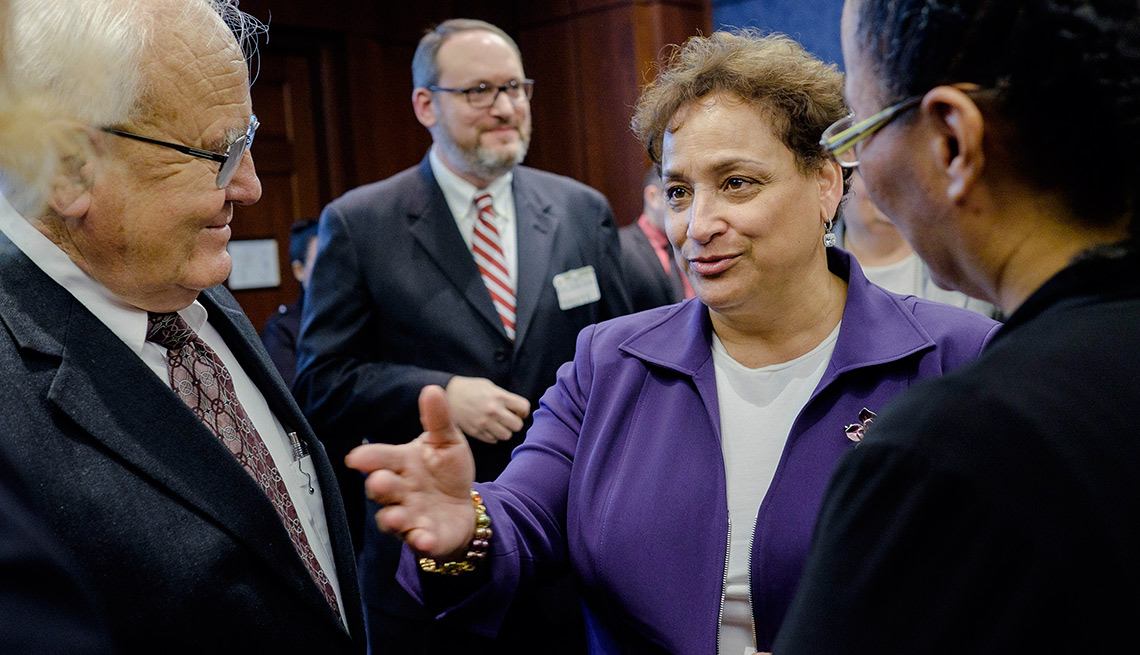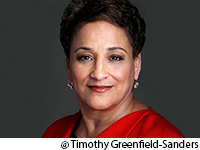It's Time to Champion Unpaid Family Caregivers
They are the backbone of in-home care for their loved ones

Photo by T.J. Kirkpatrick
AARP CEO Jo Ann Jenkins and caregivers Marianita Gorman, right, and Don Schierling, left, talk at the announcement of the launch of the bipartisan, bicameral Assisting Caregivers Today caucus.
En español | I know all too well the struggles that family caregivers face. I've experienced them in my own family. I'm sure many of you have your own stories of heartbreak, frustration and, yes, joy in providing care to loved ones.
That's why I want to give a shout-out to four members of Congress — Sens. Kelly Ayotte (R-N.H.) and Michael Bennet (D-Colo.), and Reps. Diane Black (R-Tenn.) and Michelle Lujan Grisham (D-N.M.).
They have come together to form the Assisting Caregivers Today (ACT) caucus on Capitol Hill. The caucus will shine a spotlight on the value of — and the need to support — family caregivers.
The fact that this caucus is both bipartisan and bicameral is significant and encouraging. It sends a message that members of Congress recognize that the issues facing family caregivers and the desire to live independently and with dignity are not bound by politics or ideology. They affect everyone, imposing emotional and financial burdens on families, friends, coworkers and society.
Recently AARP completed a survey of voters 40 and older and found that people — regardless of political party — are looking to Congress to improve resources for family caregivers who help seniors and people with disabilities to live independently. Family caregivers also feel it is important that services and resources are made available to help their loved ones remain at home — where they want to be.
These findings are not surprising. Family caregivers are the backbone of in-home care for their loved ones in this country. The help they provide enables older adults and people with disabilities to live independently in their homes and communities instead of in more costly nursing homes.
Caregiving Resource Center — planning resources, assisted living, end-of-life care and more »
Our other research shows:
- The economic value of the 42.1 million unpaid family caregivers is $450 billion — a figure that has only grown since we calculated it six years ago.
- Almost half of family caregivers perform medical or nursing tasks, and of these, three-fourths manage medications, including administering intravenous fluids and injections.
- As the leading edge of boomers approaches 70, the number of family members available for caregiving (mostly adult children) is falling — from more than seven potential caregivers for every family member 80 or older in 2010 to just four in 2030.
Family caregivers face unprecedented demands that leave them emotionally stressed and financially strained as they try to balance their work and family obligations. Those demands continue to grow. Yet public and private sector policies to support family caregivers have not kept pace. Congress can help by providing more access to services and resources that people need to continue living independently and by providing caregivers with respite care.
The ACT caucus will serve as a forum to engage lawmakers — Republicans, Democrats and independents — about family caregiving and the issues of long-term care for people who need it. We hope this inspires bipartisan conversations that can lead to solutions.
At AARP, we look forward to working with the ACT caucus — and with other national organizations working on caregiving issues — to find solutions that help make life better for people in need of caregiving and for those family members who provide it.
Jo Ann Jenkins is the chief executive officer of AARP.
Also of Interest
- A juggling act: work and caregiving
- 10 drugs that may cause memory loss
- Help bring relief to struggling seniors; find volunteer opportunities near you
Join AARP Now — Receive access to exclusive info, benefits and discounts

